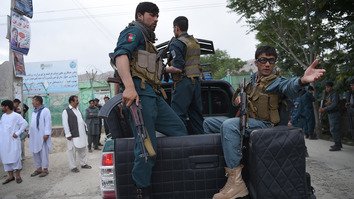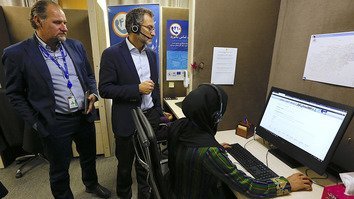KABUL -- Afghan officials are lauding the Ministry of Defence's efforts to provide a confidential hotline for civilians and security personnel to complain about corrupt, inappropriate or illegal behaviour.
The ministry July 28 launched the 196 hotline number so that witnesses can call free of charge, 24 hours a day, and report problems.
Ministry of Defence personnel as well as the families of security personnel killed in the line of duty can call the number, Abdul Naser Asfiya, the ministry's chief inspector, said during the inauguration ceremony of the hotline in Kabul.
These complaints will be addressed in a timely manner in accordance with the law, guidelines and policies of the ministry, he said.
Ministry officials called the launch of the 196 toll-free number and the grievance-handling unit an important step toward addressing complaints against Afghan National Army personnel and toward fighting corruption as well as inappropriate and illegal behaviour.
"This is for individuals from within the ministry, those serving in the Afghan National Army and the general public," said Rohullah Ahmadzai, a spokesman for the ministry. "Whoever has a complaint can get in touch and their problem will be addressed."
"If soldiers, officers or civilians have complaints and do not want their identity to be disclosed, their identity will remain confidential," he said.
Welcoming the initiative
While welcoming the launch of 196 hotline number, parliamentarians and Afghan analysts emphasised the need for serious followups to the complaints received by the ministry.
Gen. (ret.) Dawlat Waziri, a former spokesman for the ministry, praised the launch of 196 toll-free number.
"It is a good step; it should be supported," he said. "If a soldier is being mistreated or if a soldier does not receive salary or whatever the issue is, officials should hear their voices."
Mohammad Khalid Momand, a member of the Wolesi Jirga representing Logar Province, also called the establishment of the complaints hotline a good step.
It will be effective, though, only if authorities make serious efforts to follow up on complaints, he said.
"The problem in Afghanistan is that we take initiatives but do not follow up on them," he said. "I hope that the Ministry of Defence keeps its promise and takes [reported] problems ... seriously."
Lal Gul Lal, chairman of the Afghanistan Human Rights Organisation, welcomed the 196 hotline.
A culture of redressing grievances needs to be institutionalised in Afghanistan, he said.
"The culture of logging complaints and of redressing grievances is strong in other countries, but in Afghanistan, unfortunately, grievances are not taken seriously," he said.
Ensuring accountability
The office of the chief inspector will address all complaints vigorously, said Ahmadzai of the ministry.
"We are determined and serious about this," he said. "Complaints related to each section will be addressed seriously."
The 196 hotline follows other efforts by the government to set up toll-free numbers to handle citizens' issues.
The 119 Police Call Centre began operation in 2009, enabling Afghans to report crimes and suspected terrorist activities, as well as police misconduct, corruption and human rights violations.
In 2018, Afghans set up a nationwide call centre through the United Nations for their compatriots afflicted by war, violence or natural disasters. Calls made to the toll-free number -- 410 -- are all confidential.
While the Afghan government has taken positive steps toward ensuring accountability, Afghans living in areas controlled by militants have no recourse, analysts say.
Leaders in any Islamic system must be accountable to citizens, said Maulawi Zabihullah Ateeq, member of the Wolesi Jirga representing Badakhshan Province.
Militants' extrajudicial and un-Islamic activities are now fully visible to citizens who know that the militants are flouting Islamic rules and regulations, Ateeq said.
"All Afghans know that, but residents cannot say anything in areas under the Taliban control," he added. "They do not have the freedom of expression that existed during the time of [the Prophet Muhammad (PBUH)] or Khulafa-e-Rashideen, when they could critique their elders."

![Shah Mahmood Miakhil, Afghan first deputy minister of defence, cuts a ribbon to launch the 196 hotline number in Kabul July 28. [Afghan Defence Ministry]](/cnmi_st/images/2020/08/17/25536-196-585_329.jpg)







These kinds of measures have no effect on security. The government must take serious measures against terrorists. The Afghan government is still in active defense position, and Taliban and other terrorist groups kill the innocent Afghans every day. Taliban attack, but the security forces defend themselves. Afghan security forces should go out of defensive position and take an offensive position.
Reply2 Comment
It is a good move; we welcome it.
Reply2 Comment